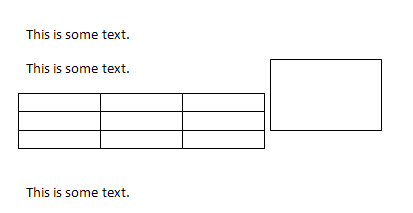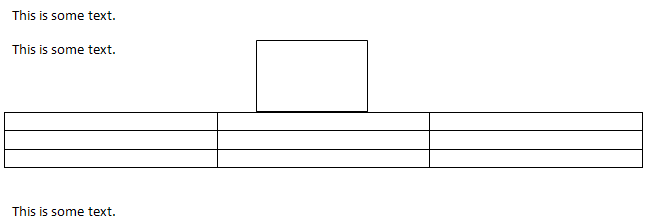doNotAutofitConstrainedTables (Do Not AutoFit Tables To Fit Next To Wrapped Objects)
This element specifies whether applications shall allow tables to be resized to the remaining available line width when they are using the AutoFit algorithm and part of that line is filled by a shape with a wrapping type with a value of square or tight.
Typically, a table which is AutoFit and has a preferred width shall have its width reduced in order to allow a floating shape to wrap around its contents within the document, as that shape simply reduces the width of the line and the AutoFit algorithm applies to the remaining line width. This element, when present with a val attribute value of true (or equivalent), specifies that tables shall never have any preferred width overridden to allow them to wrap around that floating object, and shall instead be pushed to the next full width line in the document to be displayed.
[Example: Consider a WordprocessingML document with a floating shape centered in the document, followed by a table with preferred cell widths of 2.22", as follows:

The default presentation of this document overrides the preferred cell widths to force the table to fit on the line next to the floating shape with tight wrapping.
However, if this compatibility setting is turned on:
<w:compat>
<w:dontAutofitConstrainedTables />
</w:compat>
Then that table is not resized, so it cannot fit and must be pushed to the next full width line, resulting in the following output:

end example]
|
Parent Elements |
|
compat (§2.15.3.9) |
|
Attributes |
Description |
|
val (On/Off Value) |
Specifies a binary value for the property defined by the parent XML element.
A value of on, 1, or true specifies that the property shall be explicitly applied. This is the default value for this attribute, and is implied when the parent element is present, but this attribute is omitted.
A value of off, 0, or false specifies that the property shall be explicitly turned off.
[Example: For example, consider the following on/off property:
<w:… w:val="off"/>
The val attribute explicitly declares that the property is turned off. end example]
The possible values for this attribute are defined by the ST_OnOff simple type (§2.18.67). |
The following XML Schema fragment defines the contents of this element:
<complexType name="CT_OnOff">
<attribute name="val" type="ST_OnOff"/>
</complexType>